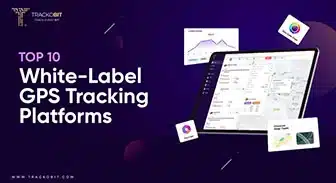-
TrackoBit
Manage commercial vehicles with the new-age Fleet Management Software
TrackoBit -
TrackoField
Streamline your scattered workforce with Field Force Management Software
TrackoField -
Features Resources
-
Blog
Carefully curated articles to update you on industrial trends. -
White Paper
Insightful papers and analysis on essential subject matters. -
Glossary
Explore an alphabetical list of relevant industry terms. -
What’s New
Get TrackoBit & TrackoField monthly updates here. -
Case Study
Explore the cases we solved with our diverse solutions. -
Comparisons
Compare platforms, features, and pricing to find your best fit.
-
About Us
Get to know TrackoBit: our team, ethos, values, and vision. -
Careers
Join the most dynamic cult of coders, creatives and changemakers. -
Tech Support
Learn about our technical support team and services in detail. -
Events
Check out the exhibitions where we left our marks and conquered. -
Contact Us
Connect with us and let us know how we can be of service.
How to Choose the Best Fuel Management Software for Your Fleet?
- Author:Anvesha Pandey
- Read Time:8 min
- Published:
- Last Update: September 17, 2025
Table of Contents
Toggle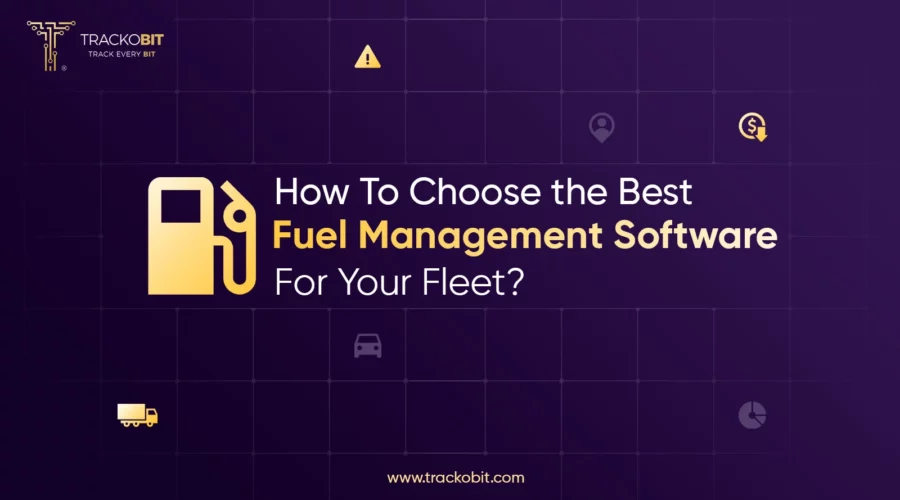
We agree selecting the best fuel management software for your fleet can be a task. Read this piece that covers what to look for and simplify your hunt for the right one.
Table of Contents
Toggle
When it comes to fleet operations, we all know every drop of fuel translates to both operational efficiency & the bottom line of the business.
Managing fuel is undoubtedly crucial as it affects how smoothly your vehicles run and how much profit you make. In contrast, old-fashioned methods like manual logs and spreadsheets are time-consuming and inaccurate.
This makes a robust fuel management software not just a desirable addition. In fact, it is a strategic imperative for any fleet looking to optimize consumption and improve its bottom line.
However, with numerous systems available, choosing the right one can be challenging. That’s why we’ve crafted this guide to help you grasp the key features of a fuel monitoring system and pick the perfect one for your fleet.
So, let’s begin!
What is Fuel Management Software?
“You can’t manage what you don’t measure—fuel management software gives you the control to drive efficiency and savings.”
Having said this, fuel management software can be defined as a technological solution designed to track, measure, and manage the petrol consumption of vehicles or machinery in real time. The system is particularly valuable for fleet-centric businesses. It helps prevent diesel theft, optimizes resource efficiency, and also reduces operational costs.
Fuel monitoring systems use GPS trackers, sensors, and telematics to track petrol levels and consumption trends. They also give insights into refueling activities to help manage fuel more efficiently.
Why Use Fuel Management System Software?
Using Fuel Management System Software as a part of Fleet Management Software is a strategic choice for optimizing fleet operations. It’s because it reduces costs & improves efficiency.
Here’s a list that justifies why combining these systems is beneficial –
1. Cost Optimization
Fuel is one of the biggest expenses in the fleet operations. A fuel management system helps you track consumption, levels & refueling activities.
Additionally, when paired with route planning software & driver behavior monitoring system, you can reduce unnecessary usage caused by idling, harsh driving, or inefficient routes.
2. Accurate Data
Well, integrating a fuel management system with fleet management software lets you access other crucial data: vehicle speed, distance, mileage, and number of completed trips. These data groups help justify petrol consumption and spending.
3. Reduced Downtime
By analyzing the trends, fleet managers can predict maintenance needs and schedule services, ensuring vehicles stay in good condition & avoid breakdowns.
4. Data-driven Decisions
Fuel management systems generate detailed reports on usage trends, patterns, and wastage. This further helps fix the gaps and resurrect the operation with smart decisions or actions.
For example, you can pinpoint heavy diesel-consuming vehicles or routes and optimize processes accordingly.
| 📍 DID YOU KNOW-
A study by the National Renewable Energy Laboratory states that fuel monitoring systems clubbed with fleet management software can improve the resource economy by up to 20%. |
Understanding Why Fuel Management Software Is Important?
In terms of consumption, fuel management software can act like a copilot that can help you make smarter decisions. Still, wondering why it’s essential for your fleet? This section explains why it’s time to modernize your fleet business.
Real-time Tracking
The primary function of fuel management software is to accurately track consumption and expenses, eliminating the need for manual data entry and reducing the risk of errors.
Cost Savings
Bad consumption behavior such as excessive idling, overspeeding etc, can lead to 15-20% wastage of overall fuel costs. The only way to reduce this huge wastage and save operational costs is by using fuel management software.
Prevent Fuel Theft
Fuel pilferage and any sort of theft are a major concern for fleet managers. To completely rid your fleet of this problem, you can use fuel monitoring software that can decipher when it was filled and ejected from the tank. This can help you manage any anomaly in the fleet’s fuel consumption process.
Better Fleet Performance
Fleet performance is especially improved with any sort of tracking system. Having the software helps you identify the overall fuel consumption. You will know which fleet needs better optimization and route planning. Lastly, you‘ll end up taking the best decisions and steps that can help you enhance your fleet performance and reduce its downtime and operation inefficiency.
Compliance
As long as the fuel management software understands the area’s compliance policies, it can help you keep your fleet compliant with regulations related to emissions and fuel usage. This is another layer of expense reduction since not complying with these strict regulations leads to major fine costs.
For Example- IFTA Compliance (International Fuel Tax Agreement & EPA Compliance (Environmental Protection Agency). Both these compliances ensure that fleet operations remain efficient, legally compliant, and environmentally responsible.
Environmental Friendliness
For most modern businesses, it is also important to take care of the environment. Fuel management software is helpful in not only reducing consumption but also lowering the impact this consumption has on the environment.
Important Factors to Consider When Choosing a Fuel Management System Software
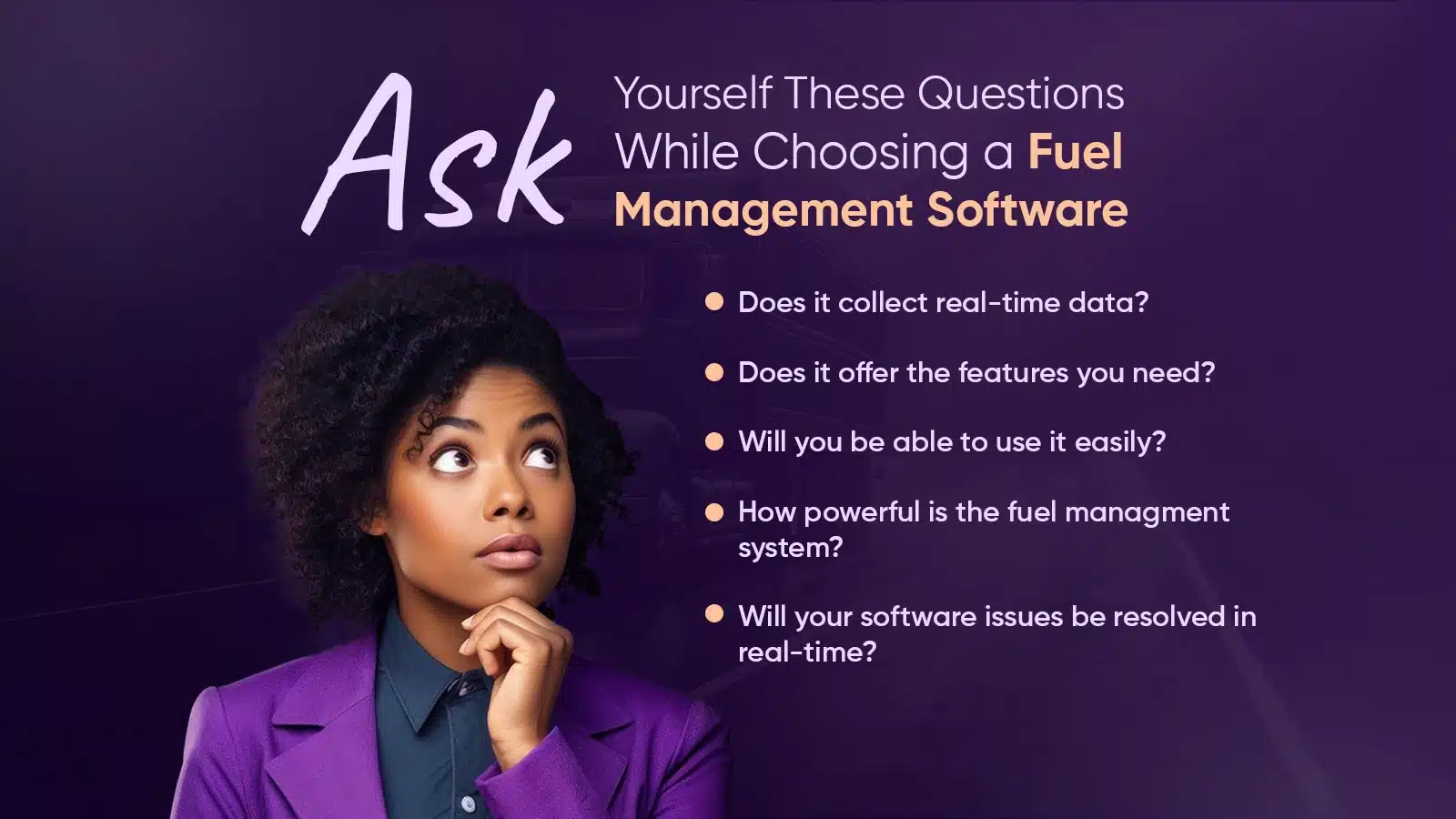
Choosing a Fuel Management Software
Sure, using fuel management software is a real game-changer for any field. However, the game can quickly go in reverse if you’re using an inefficient solution. After all, you’d be paying for it but will not get anything in return!
So, if you want to ensure that your investment is only put in the right place, be sure that the software complies with all the following criteria as per your business requirements.
1. Real-time Data Collection
Monitoring real-time data should be the first prerequisite of choosing the right fuel management software.
Why?
Because you will find a lot of tools out there that will only give you weekly/monthly reports, but will not be able to give you real-time data tracking and collection capabilities.
Tracking live data and consumption details can be important for small features offered by TrackoBit such as an ejection alarm. Moreover, real-time data collection allows you to get a more in-depth understanding of your fleet, allowing you to see more clearly where you need to make changes to reduce consumption.
2. Features and Alerts
Most fuel management software is designed to monitor tank levels and provide basic leak detection, alerting you if there is a problem or concern. However, as with anything, there are numerous alternatives, each with varying degrees of utility.
Some of the basic features and alerts that you need to will need with your fuel monitoring system are:
- Tank capacity monitoring
- Petrol fill/ejection reports
- Sudden tank activity alerts
- Possible theft alarms
3. Ease of Use
What is the point of using a fuel management software system that is very difficult to understand and operate? In today’s time, User Experience is very important to integrate within the software, otherwise, no one will stay.
Therefore, if you really like the software but it is so complex to use that you will need weeks of training to get it – let it go!
4. Compatibility
A good fleet fuel management software should be able to function on multiple device types. To be able to support completely remote-centric operations, compatibility with computers and mobiles is a must.
Moreover, while this is seldom a problem, the software should also be able to monitor any vehicle and its tank type.
5. Reporting Capabilities
Since monitoring and management are the two major reasons why you are willing to use fuel management software, the kind of reports it generates is crucial. Make sure that the software is able to give you reports as wide as total fleet consumption and as small as real-time consumption graphs. Reports like consumption, vehicle idling, overspeeding, and ejection are crucial.
6. Robustness
Robustness can be measured in two ways – its safety against cyber threats and its capability to stay functional at all times. When choosing fuel management software for your fleet, make sure that it is as hacking-proof as possible.
After all, you will be storing all your fleet’s information in this software. And some of this information can be sensitive.
Similarly, if you are using the software for its real-time capabilities, if it keeps crashing now and then, the whole point goes moot, right? Make sure that the software in question has little to no downtime.
7. Customer Support
Good customer support is essential when it comes to using fuel management system software.
Look for a provider that offers 24/7 customer support and training, so you can get help whenever you need it. After all, you will only be able to enjoy real-time data tracking if you can get solutions to all problems in real-time as well, right?
8. Price
When running a business, getting the right ROI and getting to the breaking point as quickly as possible is essential.
Of course, price is always a factor when choosing any software. Look for a fuel management system software that offers a good balance of features and affordability, and that fits within your budget.
Don’t Waste Another Drop of Fuel – Choose TrackoBit!
“An investment in knowledge pays the best interest.” – Benjamin Franklin
Knowledge is power, especially when it comes to managing consumption patterns & managing fuel expenses effectively.
Thus, having insights into consumption patterns becomes really important.
By investing in reliable fuel management software, you gain access to detailed data, insightful reports, and actionable analytics. With this information at your fingertips, you’ll understand your fleet’s usage and expenses better—empowering you to make informed, strategic decisions.
At TrackoBit, we understand that knowledge is power, especially when it comes to efficiency.
That’s why our telematics solutions are designed to impart knowledge and awareness on your fuel usage, patterns, and operational efficiency.
Looking for a robust Fuel Management System Software to take your business to the next level?
Join forces with TrackoBit today!
FAQs
-
How does a Fuel Management System work?
It integrates with vehicles to collect fuel data, analyzes usage patterns, and provides actionable insights through reports and alerts.
-
Can it be integrated with fleet management software?
Yes, it integrates seamlessly with FMS for comprehensive fleet insights and better decision-making.
-
Can it prevent fuel theft?
Yes, by monitoring fuel levels and consumption, the system detects anomalies like sudden drops. Further, it helps alert managers.
-
What industries can benefit from it?
Industries like logistics, construction, agriculture, and public transport can greatly reduce costs and improve efficiency with a fuel management system.
Anvesha is a communication specialist at TrackoBit. With a strong background in media and communications, she adds much-needed balance and brevity to TrackoBit’s... Read More
Related Blogs
-
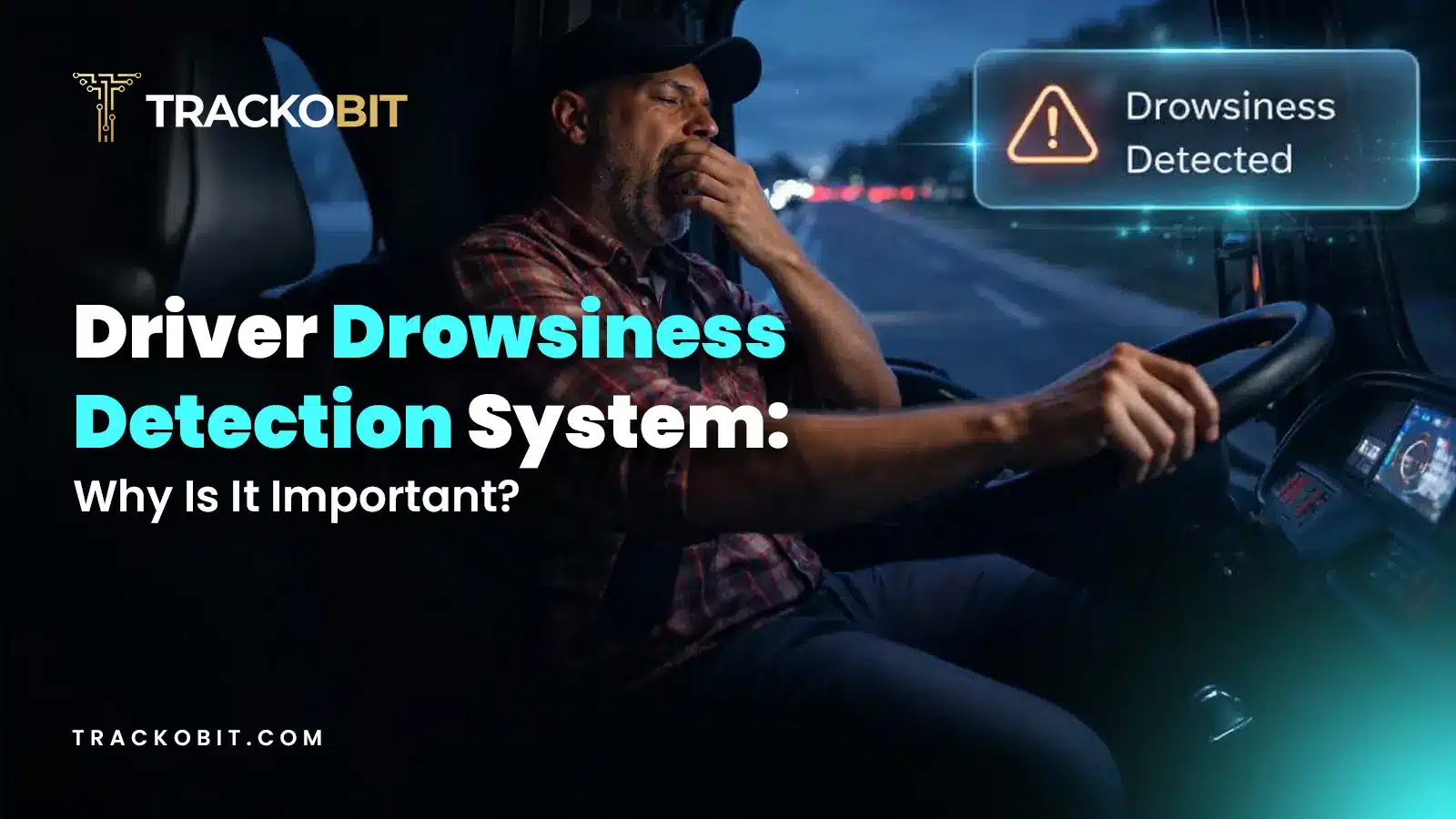
Why is Driver Drowsiness Detection System Important for Fleet Management?
Shemanti Ghosh February 4, 2026A driver drowsiness detection system is critical for fleet management. It helps prevent fatigue-related accidents and reduces operational risks through…
-
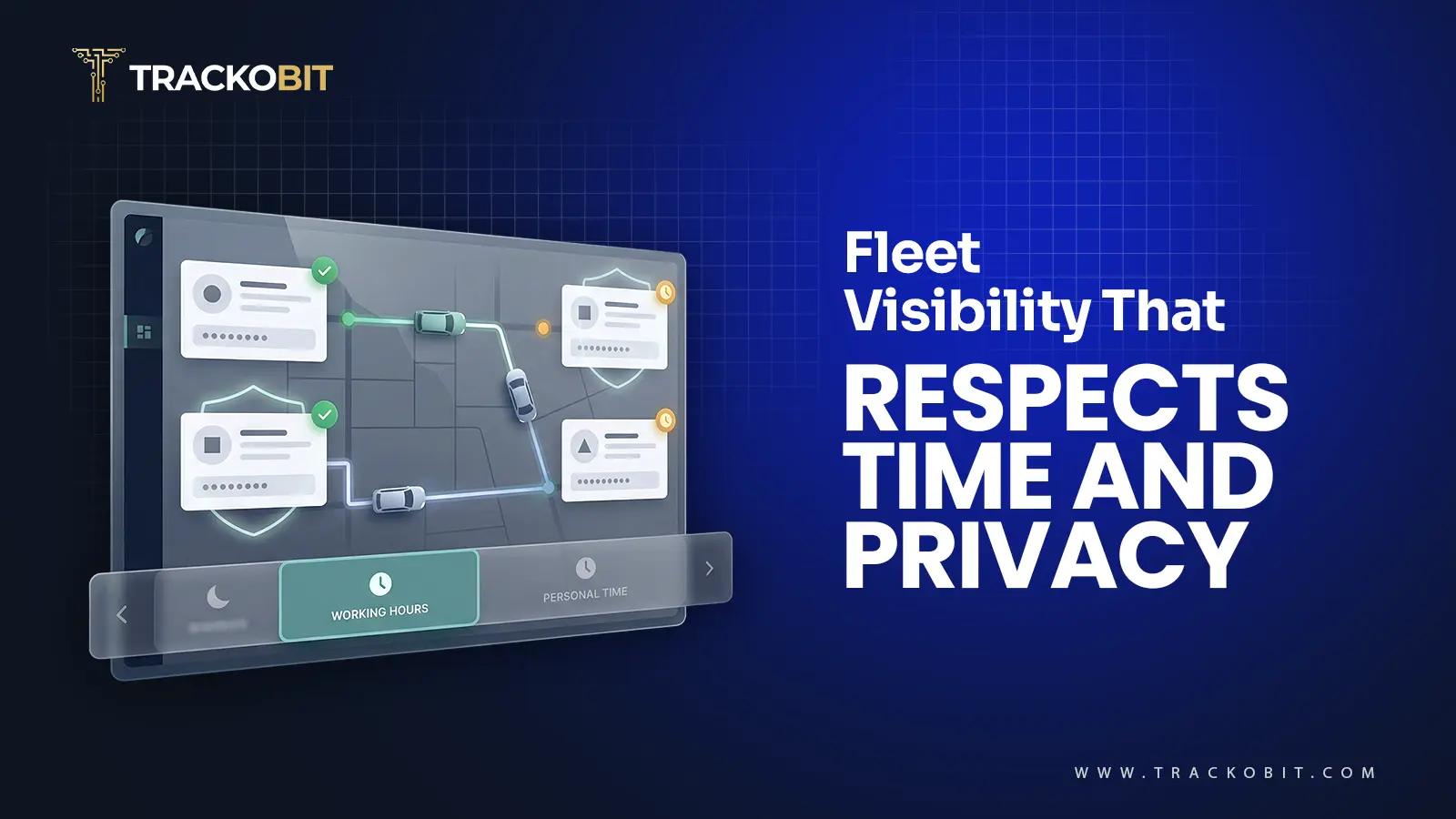
When Tracking Needs a Clock: Rethinking Fleet Visibility
Tithi Agarwal December 24, 2025Read on to understand why fleet tracking works better when it follows working hours. Because visibility should support operations, not…
-

What Makes TrackoBit’s Video Telematics Software Truly Next-Gen?
Shemanti Ghosh December 17, 2025TrackoBit’s video telematics software blends smart video intelligence with full server control. The result? Superior fleet reliability and safety.
-
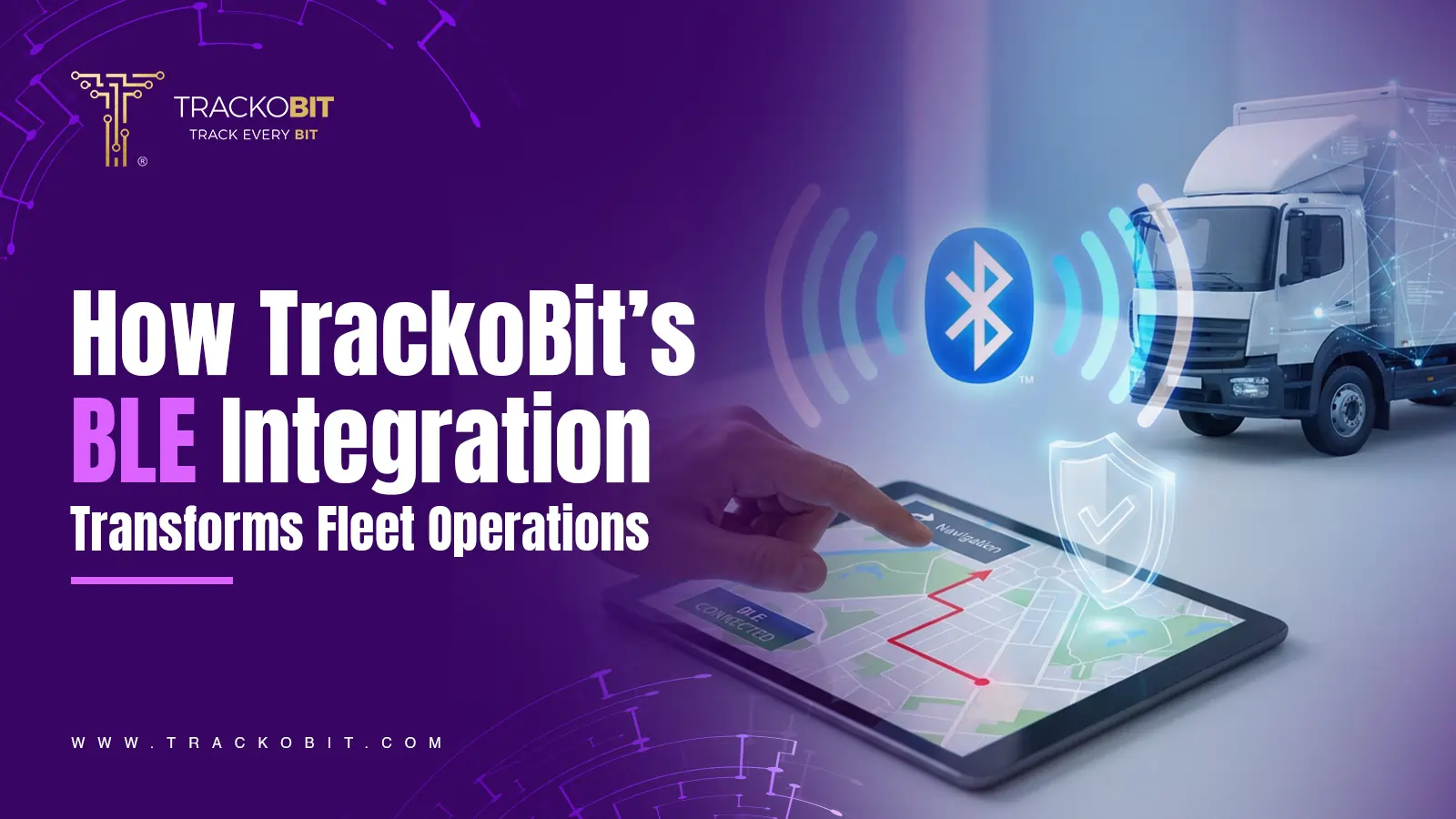
Plug, Pair, Perform TrackoBit Introduces BLE Sensor Integration
Tithi Agarwal November 26, 2025TrackoBit’s BLE Sensor Integration enables wireless, real-time monitoring with faster installs and accurate insights. It improves fleet efficiency, visibility, and…

Subscribe for weekly tips to optimize your fleet’s potential!
Your inbox awaits a welcome email. Stay tuned for the latest blog updates & expert insights.
"While you're here, dive into some more reads or grab quick bites from our social platforms!"Stay Updated on tech, telematics and mobility. Don't miss out on the latest in the industry.
We use cookies to enhance and personalize your browsing experience. By continuing to use our website, you agree to our Privacy Policy.



































